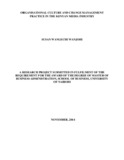| dc.description.abstract | The objective of this research is to analyze the effects of organizational culture on change
management practice in the Kenyan media industry. Change is an inevitable part of any
growing industry and especially a dynamic and rapidly growing industry as the Kenyan
media industry. The forces of change are brought about by the political, social,
technological, economic and legal environment in which all organizations operate in.
Intense competition has also emanated from the rapid growth of the industry, change of
its environment and change of the consumer in terms of literacy levels and global
exposure. Organizational culture which is defined as the behavior of humans within an
organization and the meaning that people attach to those behaviors is at the very core of
change and this study therefore seeks to understand and analyze its effects in change
management. This research was conducted through a cross-sectional survey of the media
houses in Kenya and the type of data collected was both qualitative and quantitative in
nature. This data was collected through the use of a questionnaire instrument which
contained both Close ended questions which served the purpose of collecting viable
quantitative data while open-ended questions allowed for in-depth responses. The target
respondents were both senior and middle level managers in their respective companies.
The qualitative data collected was analyzed through content analysis while the
quantitative data was analyzed using descriptive statistics that is by use of mean, standard
deviation and frequency distribution. The data collected and analyzed was presented in
form of tables, frequencies and percentages for the quantitative data and the findings
from the open ended questions which was of a qualitative nature was presented in prose
form. The study established that change is a process driven by several strategic
considerations including the need for more integrated ways of working and the need to
improve business performance. These considerations typically are the result in structured
change programs based on the assumption that change management consists of a limited
set of interventions that can be realized in a relatively short time. One major
consideration in the change process is organizational culture as it inculcates most of the
steps used in change management. The study recommends a careful assessment of the
available resources, their competence to manage the change process and most
importantly, type of organizational culture the organization currently operates in.
Organizational culture is a major determining factor of how any organization embraces
and implements change. The implications of this study on policy is that it shall facilitate
the development of more clearly articulated understanding of change management and
ensure organizational culture is evaluated in the process of change. In theory, the study
will encourage the development of a dynamic change model that has multiple variables
hence enabling a better understanding of the process. The implication of this study in
practice is to ensure that organizations practically evaluate all the relevant variables and
by extension thereby involves all the relevant stakeholders for a more efficient change
management process. | en_US |

